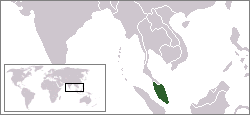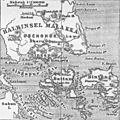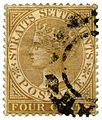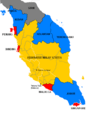British Malaya facts for kids
British Malaya was a large area in Southeast Asia, including the Malay Peninsula and Singapore Strait, that was controlled by the British Empire. It was a very important place because it produced a lot of tin and rubber for the world.
British Malaya was made up of three main parts: the Straits Settlements, the Federated Malay States, and the Unfederated Malay States. The British started trading in this region around the 1800s, and by the late 1800s, it had become a full British colony.
Contents
A Brief History of British Control
The British became interested in Malaya because of its valuable resources and its important location for trade routes. They slowly gained more control over different parts of the region.
Early British Influence
The British first set up trading posts in places like Penang and Singapore in the late 1700s and early 1800s. These areas became known as the Straits Settlements. They were directly ruled by the British government.
Growing the Colony
As the 1800s continued, the British expanded their influence. They signed agreements with local rulers, known as sultans, in the Malay states. This led to the formation of the Federated Malay States and the Unfederated Malay States. While these states still had their own rulers, the British had a lot of power and influence over their decisions.
Life in British Malaya
Life in British Malaya was a mix of traditional Malay culture and British ways. The British built new roads, railways, and ports to help move the tin and rubber. Many people from other countries, like China and India, came to Malaya to work in the mines and rubber plantations.
Economy and Resources
British Malaya was a global leader in producing tin and rubber. These resources were very important for industries around the world. The money made from these exports helped develop the region, but also benefited the British Empire.
World War II and Independence
During World War II, British Malaya was occupied by the Japanese army. This was a difficult time for the people living there. After the war, the British returned, but the desire for independence grew stronger.
Path to Self-Rule
After World War II, the British tried to reorganize Malaya. However, there was strong opposition from the local people who wanted to govern themselves. This led to a movement for independence.
Formation of Malaysia
British Malaya was replaced by the Federation of Malaya in 1947. This was a step towards self-rule. Finally, in 1957, the Federation of Malaya gained full independence from the British. Later, in 1963, the Federation of Malaya joined with other territories to form the country of Malaysia.
Images for kids
-
Kuala Lumpur around 1884. This mining town grew to become the capital of Selangor, and later the capital of the Federated Malay States, the Federation of Malaya, and Malaysia.
-
Malaya in 1922. The unfederated Malay states are in blue, the
 Federated Malay States (FMS) in yellow, and the
Federated Malay States (FMS) in yellow, and the  British Straits Settlements in red.
British Straits Settlements in red. -
A protest against the Malayan Union by Malays.
See also
 In Spanish: Malasia británica para niños
In Spanish: Malasia británica para niños
 | Jackie Robinson |
 | Jack Johnson |
 | Althea Gibson |
 | Arthur Ashe |
 | Muhammad Ali |







